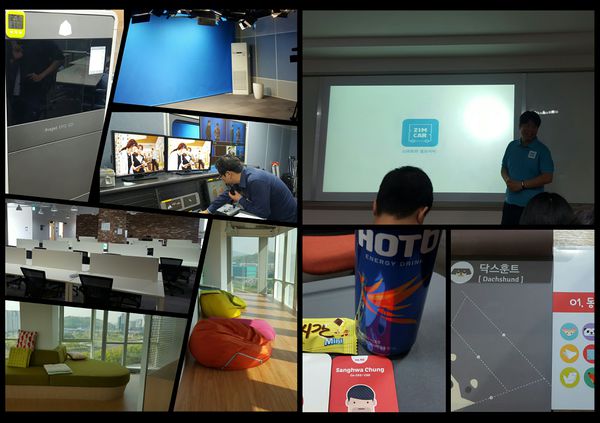1415T2g1 South Korea/Reflection
South Korea
| Day 2 |
Contents
Day 1: Reflections
Quick Introduction of JJS Media
Learning Points from JJS Media
- Product is important, but don’t forget the team – with a team that is able to synergized each other’s ability to produce the best result, it will increase the overall value of the product and makes everything more easier
- Common in Asia to get your idea stolen – if you have an idea, you should always have the motivation to kick-start your project as soon as possible
- Knowing the demographic is key to marketing your product – with a specific target audience in mind, a deep understanding on the demographic trends in a market can help speed up your marketing
- Leaders in a start-up have to be confident – by being confident, it creates an ripple effect around the team which can be essential to the success of a start-up
Quick Introduction of FiveThirty
Learning Points from FiveThirty
- Greater interest in your project if the problem affects you directly – from our Q&A session with Mr. Lee, he mentioned that the problem identified by the team will generate greater interest and bond the team if each member is directly affected by the problem as they see a great need to solve the problem
- Importance of a clear vision and goal – to bring your company forward, the team must have a clearly-defined goal which is formulated and agreed by each team member
- Desperation propels you forward – in a start-up, there are many times where you will encounter problems which you put you on the brink of failure. However, we should are take an optimistic look to the problems and see them as a motivation to being your company forward
The director of international business of JJS Media, CJ was approachable and funny. She explained briefly about how a typical live performance is being implemented and highlighted several speculations and guesses when promoters invite a particular artist to the country and how MyMusicTaste filled that void. MyMusicTaste helped artists to explore into new markets that they have never known about as well as guarantees the demand for a certain artist’s live performance. She shared with us many interesting stories about how she was persuaded to be part of the company and the setbacks that she has faced and how her CEO has helped her tide over that failure. The way that MyMusicTaste grew organically through referrals from different users has shown that the power of word of mouth is really a strong marketing strategy for the JJS Media. I feel that the developers and founders have to manage a community around their startup and leverage on the initial user base to bring in more like minded individuals into the platform. I actually struggled to create a sizeable community when developing a web application for a module in SMU. I would really want to know more from the startups on the marketing strategies and effectiveness of their most effective marketing platform and how did the utilize it to bring in the best results. She emphasized the importance of having a great team with synergy and that even if the idea was not good, it will still turn our great eventually. I do agree that having a great team is good and it was one of the factors that sometimes dissuades me from creating a startup on my own. FiveThirty was a gracious host and welcomed us with gifts. Zim Car was an interesting concept, being the middle man to source for resources to help their users move to a new home. They focused heavily on user experience as their unique selling point to differentiate themselves with the competition and that they have a first mover advantage when it comes to this idea. However, they might want to handle issues such as people not showing up to the job or vehicles that are not working properly to move the items and what is the contingency when such issues arise.
JJS Media
C.J proceeded to elaborate on the hurdles start-ups used to face. Firstly, she believe that the act of being able to convince potential investors to invest on an idea is a difficult task. This is because money is an important cash flow for start-ups. However, such investments are hard to come by as investors are often skeptical of ideas which are not pitched in the “right way’. Hence, in order to convince investors, C.J. highlighted that it is extremely essential for one to be able to visualize and believe in his own ideas before he will be able to convince others. This is often the most difficult hurdle as the founder of the startup will also have to be willing to go without any pay during the early development of the start-up to ensure that the staffs are paid. The second hurdle was the importance of knowing the demographics of the target group. C.J. explained that failure to understand and analyse the market trend can be extremely detrimental too since such work often incur lots of costs. Thirdly, competitors. C.J shared about how JJS’s first application, the Mironi (i.e. somewhat like Spotify), had failed due to competition. Before Mironi could go big, it was replicated by a competitor and this has caused JJS Media to incur losses. As there was no legal protection to prevent such an acts, JJS Media had decided against suing the competitor. Nonetheless, besides these hurdles, there were also success stories which C.J shared. After learning from their mistake on Mironi, and identifying a real need for an application to bring international concerts to fans all around the world, JJS Media created the MyMusicTaste application. This application basically allowed fans to select their artists and venue, get their friends to vote for it and crowd fund for the concert. This allows JJS Media to foresee the demand for this particular artist and convince promoters to pitch in their efforts to ensure that the concert can be held.
This was a great learning experience as it has provided me with many insights such as how to foresee the various challenges of embarking on a startup. It also taught me about the importance of having a clear goal for the start-up. This is to help the founder ensure that the start-up is progressing in the right direction.
Five-Thirty
The CEO, Mr Sanghwa Chung mentioned that the purpose of Zim Car is to help single families / people ease the chore of moving house with ease. It will include the provision of the Zim box which consists of all the essentials needed for packing such as gloves, tapes and others. In addition, the Zim car will also be provided with 2 Zim men to do the moving. All these will be done at a affordable and competitive price. He mentioned that he believed that the demand for such services is high as Korea has a huge consumer base which comes from single families / people and he strongly believes that the differentiating factor from Zim Car and other similar application will be its customer services, creative Zim Box idea and its competitive price.
The CEO also introduced to us Mr Lee, the company’s no3 in decision making. Mr Lee shared that he used to have a comfortable job in the aerospace industry but left to pursue his passion for start-ups. Nonetheless, he mentioned that he had met with several failures in his start-ups, one of which he failed because he had a lack of passion for the application he is doing. He also mentioned that if given a chance to start all over again, he will not want to pursue a start-up as with his family now, he has numerous responsibilities to hold and pursuing in a start-up does not guarantee him a constant cash flow.
From this, I learnt that perhaps, what he said was indeed true as under circumstances, passion has to take the back sit when survival and responsibilities are of up most importance at the moment of time for the entrepreneur. I also learned that because of such issues, it would definitely be more favorable for me to experience working in a start-up when I am young whether the start up will succeed highly depends on the level of commitment that it founders place in it.
More than just your passion, you need to create a culture at which people would be willing to work hard with you and feel that the company is also their company. JJS Media said that the culture in the company is that they feel like a family, while FiveThirty said that it is important to make people happy so that they would be willing to work.
The slight different between the two companies is that JJS Media seems to have a clearer focus, targeting the global population who likes K-Pop while on the other hand, FiveThirty has 3 apps which are differ from one another. I believe that it is important to have a focus/ clear goal in a company, especially when a company first starts because they have limited resources, but as they grow, they will be able to diversify.
In short, both companies tell us that if you don’t have the passion for it, you won’t be able to continue your business because in a start-up, often you have to put more energy and time to grow your business. Finding a team which are driven and love the company and building a culture which makes them feel happy are also important aspects. If the goal of the company aligns with the personal goal of the people, they would be willing to work an extra mile for the company. The team, the culture, and the passion are definitely critical in starting a business.
JJS Media
JJS Media is an interesting events company that first finds the performances that people and communities are interested in, before liaising with the various parties to bring the performers in. This provides performers with a more accurate guarantee and ensure that the concerts staged will have an audience for it.
The lady that greeted us went by the name of CJ. She is the director for marketing, and one of the key employees of the company. Prior to that, she was part of the entertainment scene, handling concerts and performance organising. The current project is an app called MyMusicTaste. One of the main drivers for the creation of this app is that many concerts are cancelled, with organisers having to then figure out what went wrong behind these concerts, often leaving these organisers having to figure out if the problem lies with inaccurate demand predictions, or inappropriate pricing issues.
One of the key learning points is that it is important to understand their advantage and leverage on it to help businesses create a beach head in their market. Being a Korean company, they naturally have easier access to K-Pop groups. Therefore, they made the decision to first pick up Korean groups, and try to market them to determine places to hold concerts. This provided them with a competitive advantage that other concert organising companies might not have — access to the Korean markets. They have also decided to focus on K-Pop and the related genres. This helps to the app community to grow organically due to the nature of fans liking and requesting for similar groups, growing the app’s user base.
Another key point is the important of leadership. The leader of the company serves as the key motivator, the one that drives the company. The leader has to lead, and to show himself as a role model for other employees to look up to. The example given was when CJ was overseas and encountered her first failure, she was close to giving up on everything. However, it was due to her CEO’s present at the scene that touched her heart, and made her realise that he is a good person to work for.
Five Thirty
Five Thirty is a mobile app development company. Its current project is focused on helping people move, providing a one stop service for packing and delivering.
The key thing to note is that for the company, there are 2 CEOs operating the company, one driving the technical side while the other one, the business side. They mentioned that the way for them to resolve conflict, figuring out who makes the call is through constant communication, and to have a third person as a mediator to objectively look at the 2 conflicting viewpoints that the 2 different CEOs might have.
However, I am still not unconvinced by the business model for scaling. The ZimMan and ZimCar are both crowd-sourced resources. This means that there is no assurance that the app will be able to have sufficient resources to meet user demands. Furthermore, there could be legal and other considerations when attempting to push these to other countries (e.g. in Singapore, trucks and lorries are required to be registered to companies, which could serve as a problem since most company vehicles drivers would not want to moonlight with company vehicles).
The United States has long led the way as the leader in high tech innovations. This is largely attributed to the fertile ground it has provided for tech startups - access to capital and a culture that celebrates risk taking. However, there is one city that is developing itself into another important tech hub, the next Silicon Valley: Seoul.
The number of startups operating in South Korea quadrupled from approximately 3500 in the early 2000s to 15,401 in 2008. With increasing governmental support and an influx in foreign and local investors, the number of start-ups readily doubled to 28,763 in 2013.
As we embark on our first company visit, I really hope that these 5 days will help me understand and gain an appreciation of the factors that shaped Korea’s tech start-up scene, which used to be non-existent in the early 1980s. The first company, JJS Media, sets as a good example of the opportunities and challenges faced by a start-up. “My Music Taste” is developed by the JJS team with the intention of disrupting the concert ticketing industry. I personally feel that developing such technologies work as a double-edge sword. On one hand, the company is able to target a big and wide market, which gives them the potential to scale exponentially. On the other hand, such technologies run the risk of inviting attacks from companies which are going to be affected by the disruption. This could be in the form of conglomerates buying out the product, or worse still, replicate the technology and start squeezing the start-ups dry.
Despite that, I am inclined towards believing that JJS Media will succeed and grow to become a very successful company in the next 5 to 10 years for the following reasons. Firstly, the company has garnered support from stronghold investors including Samsung. The presence of such investors will not only spark greater confidence in potential investors, but also acts as a protection towards the tragedy of start-ups being crushed by the giants. Secondly, the team is made up of diverse individuals, each expert in their own field. Their members comprises of geniuses graduating from elite schools such as KAIST and Carnegie Mellon. Yet interestingly, their interview selection is based largely on being able to portray critical thinking skills over academic grades. The team dynamics is hence a good blend of both the geniuses as well as the critical thinkers. Lastly, the company has made very clear progression steps for their future. To ride on the advantage of being an early adopter of this technology, I feel that it is very wise for the company to roll out their plans to expand to the US and China market at the end of this year. This is a very well-timed move, especially after JJS had recently received their Series A funding.
The second company, Zim Car, provided another perspective of the nature of start-ups. The implementation of this application is not exactly one that is disruptive to the entire ecosystem, neither is it a game changer. Instead, it is going back to the fundamentals of using technology to boost an existing business model by having new features that will help increase customer satisfaction and usability. The concept behind making package delivering easy and hassle free is not new. However, I believe that Zim Car successfully identified that Koreans are in a constant quest for efficiency in every sphere of their life, and they boasts the highest smartphone ownership rate in the world. Thus, leveraging on the mobile platform, alongside understanding the users’ concerns, needs and wants will be a key to their success.





















